I Wake Up Streaming: May 2021
Movies
In this edition of “I Wake Up Streaming,” novelist William Boyle rounds up his top streaming picks for the month of May. The column’s name is a play on the 1941 film I Wake Up Screaming, starring Betty Grable, Victor Mature, and Carole Landis. While the film’s title hits a pleasing note of terror and despair, changing that one letter speaks to the joy of discovering new films and rediscovering old favorites, as well as the panic that comes with being overwhelmed by options.
A Place in the Sun (Prime Video)

I’ve loved Montgomery Clift for a long time. As a kid, I probably saw The Misfits first, but it was Howard Hawks’s Red River that made me fall hard for Clift. A true melancholy heart fueled his performances, and I responded to him immediately, even more than I responded to Brando and Dean. A Place in the Sun, George Stevens’s adaptation of Theodore Dreiser’s An American Tragedy, features Clift at his best. He plays George Eastman, who arrives at his rich industrialist uncle’s factory looking for a job. George has been raised by an overbearing, devoutly religious mother, and he’s looking for a way into the real world. He doesn’t want to cut any corners, just wants to get his foot in the door. His uncle obliges. At the factory, George meets fellow worker Alice (played with guts by Shelley Winters), and they begin a relationship. George coerces Alice into sleeping with him. Almost simultaneously, he is being tempted by the upper-crust world of his uncle. He wants in. Seeing Angela Vickers (an absolutely glowing Elizabeth Taylor) cements it. George pursues that life and makes it happen, but he must sacrifice lowly Alice, whom he never much cared for. It’s a movie about class and upward mobility and the lie of the American Dream. Dreiser based the novel on the 1906 murder of Grace Brown by Chester Gillette. I first saw A Place in the Sun years ago. Rewatching it now, in the midst of an accidental Dreiser adaptation kick (William Wyler’s Carrie and Marion Gering’s Jennie Gerhardt preceded this), I was blown away all over again. Clift is majestic as George, conflicted and tender. What other actor could’ve made us both care about and hate this character in this specific way?
Minnie and Moskowitz (Criterion Channel)
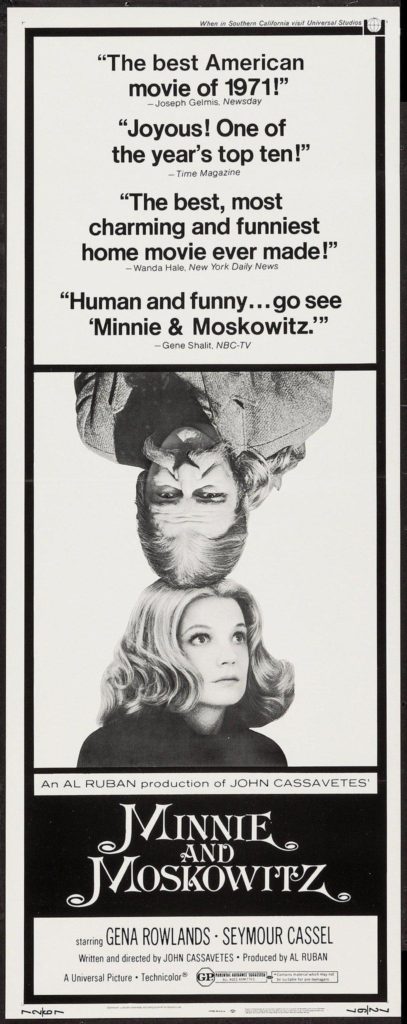
I could turn this whole column into a love letter for the Criterion Channel, but instead I’ll just highlight one of my favorite films featuring one of my favorite actors by one of my favorite directors. The Gena Rowlands collection that’s part of Criterion’s May lineup is essential—great film after great film featuring knockout performances by, for my money, the best to ever do it. Minnie and Moskowitz from 1971 is the biggest draw because—except for a few screenings here and there—it’s been pretty impossible to see for a while. It flitted on and off of Netflix for a brief stretch maybe five years ago, but—other than that—it’s never been streaming to my knowledge. It’s never gotten a Blu-ray release and had a spotty early DVD. In other words, the fact that it’s more widely available is cause for celebration. To be sure, it’s not for everyone. Your old man, who only likes war movies, or your dipshit brother, who sweats when there’s no CGI action, might be rattled by Gena Rowlands and Seymour Cassel screaming at each other for a couple of hours. Romantic screwball genius beauty. Harrowing and human. A masterpiece that’s even more of a masterpiece than I remembered.
Bound (Prime Video)
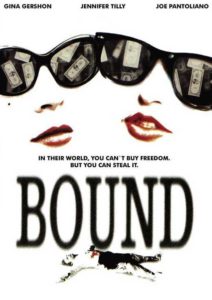
Before Bound was released in 1996, the Wachowskis’ only credit was the screenplay for the Sylvester Stallone/Antonio Banderas dud Assassins. This was a few years before The Matrix was released, and it’s a hell of a first film for the sibling team. As a high school kid who loved crime pictures, I was drawn in by the promise of a B noir with a twist, and that twist definitely brings heat and freshness. Gina Gershon plays Corky, an ex-con who works a maintenance job at a Chicago building undergoing renovations. Her neighbor Violet (Jennifer Tilly) is a moll to a paranoid mobster named Caesar (Joe Pantoliano). Corky and Violet are immediately drawn to each other. It’s a great hook. And the casting is just perfect—I can’t imagine anyone but Gershon, Tilly, and Pantoliano in these parts. Revisiting it, I was worried that it wouldn’t hold up, but it does. Big-time. Even better than I remembered. One of the great neo-noirs of the ’90s. It got a good Blu-ray from Olive Signature a few years ago, but it’s not often available on streaming services—catch it while you can.
The Set-Up (Criterion Channel)
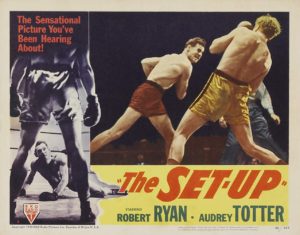
Also featured on the Criterion Channel in May is a stellar Robert Ryan lineup. Another all-time favorite actor of mine, Ryan could be menacing and tragic and beautiful all at once. You can’t go wrong with any of the films included in the collection, but I’ll stick with Robert Wise’s The Set-Up as my favorite, a gritty seventy-two minute noir (based on a 1928 narrative poem written by Joseph Moncure March) where Ryan plays Stoker Thompson, a has-been boxer expected by some wiseguys to take a fall. Adding to the tension is the knowledge that his manager hasn’t let him in on the fix—he only learns of it late in the fight. Ryan shines, playing the battered and betrayed Stoker with a quiet grace. The movie takes place in real time, and Wise is obsessed with time beyond that—age, loss, the past slipping away from the present. A classic noir and one of the best boxing films ever made.
What Happened Was . . . (Criterion Channel)
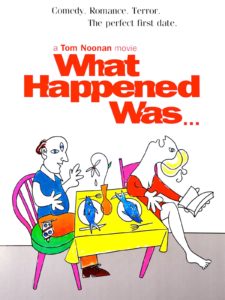
A love letter to the Criterion Channel, I warned you. God, this movie knocks me out. Tom Noonan’s 1994 indie features two characters in a New York City apartment on a date. Karen Sillas plays Jackie Marsh, the host, whose walls feature a poster for Andrew Lloyd Webber’s Cats and a big picture of Martin Luther King, Jr. She has a couple of mannequins and a strange dressing room. From her apartment, she can see into apartments across the way—people watching television mostly. When Michael (played by writer/director Tom Noonan) arrives, she serves him microwaved scallops. They work together at a law office, though neither has a very desirable position. As the evening goes on, their conversation gets stranger (both reveal the dirty secret that they’re writers), culminating in a long scene where Jackie reads an eerie story she’s written. Ostensibly marketed as a rom-com in 1994, this is anything but. It’s claustrophobic, tense, sad, warm, and it does so much with so little space. Though it often feels play-like, it’s never stagey and feels very cinematic. Sillas gives a brilliant performance as Jackie, and Tom Noonan—you almost certainly know him from something (Heat, Mystery Train, Manhunter, Gloria, The Pledge) even if you don’t recognize his name—is equally terrific. It’s not surprising to learn that Charlie Kaufman is a big fan of this film (he went on to cast Noonan in Synecdoche, New York and Anomalisa), and you can see its influence on him. What Happened Was . . . is a psychological study grounded in the surreal and shot through with tenderness and melancholy. An underappreciated beauty, this film.
Dogfight (HBO Max)
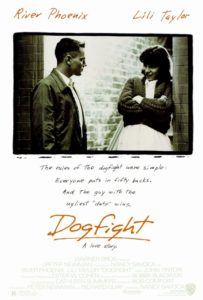
This year, the TCM Classic Film Festival is being presented virtually on TCM and HBO Max. There are many highlights (The Mortal Storm, Scarecrow, the L.A. Rebellion collection, and the Streets of New York collection chief among them for this viewer), but I’m going to focus on one film I’m especially excited to see featured: Nancy Savoca’s 1991 masterpiece Dogfight, starring River Phoenix and Lili Taylor. This film had a tremendous impact on me as a kid, opening up new ways of seeing and understanding. I was twelve when I first watched it—a watershed year of discovery for me—and I’d say it was one of the first non-crime films I saw to really challenge my expectations. It’s a coming-of-age story that subverts traditional coming-of-age tropes. A dissection of toxic masculinity. A sensitive and tender and touching film that I loved before I fully understood it. A film full of yearning and brokenness. I’m beyond glad to say it played a big part in shaping who I am. Phoenix’s character is eighteen-year-old Marine Corps volunteer Eddie Birdlace. He and a few of his buddies are out on the town in San Francisco the night before shipping off to Vietnam. For kicks, they have a contest that involves finding the ugliest girl they can and bringing her to a pre-planned party. The objective: the guy who brings the ugliest girl takes home the cash. Cruelty writ large. Phoenix homes in on Taylor’s Rose Fenny, a homely waitress he encounters at a café. He brings her to the dogfight, but that’s really only the beginning of their night, as the movie shifts away from what you fear it might well become. As far as I know, this is Dogfight’s streaming debut. It’s been available on DVD, has played on TCM, and is rentable, but the fact that it hasn’t been easily discoverable has allowed it, unfortunately, to get a bit lost to time. It’s included at the TCM Fest among the Discoveries collection, and I sure hope that a new generation of film lovers who have missed it so far seek it out now. It’s certainly one of Phoenix’s finest performances (neck and neck with Running on Empty and My Own Private Idaho for me), and Taylor is absolutely revelatory. Dogfight still feels so rare, so perfect. It’s a film I always feel truly thankful for.
William Boyle is the author of the novels Gravesend, The Lonely Witness, A Friend Is a Gift You Give Yourself, and City of Margins, and a story collection, Death Don’t Have No Mercy. His novella Everything Is Broken was published in Southwest Review Volume 104, numbers 1–4. His writing on film has appeared in Oxford American and CrimeReads. He used to have a blog about ’70s crime films called Goodbye Like a Bullet. His website is williammichaelboyle.com.
More Movies
